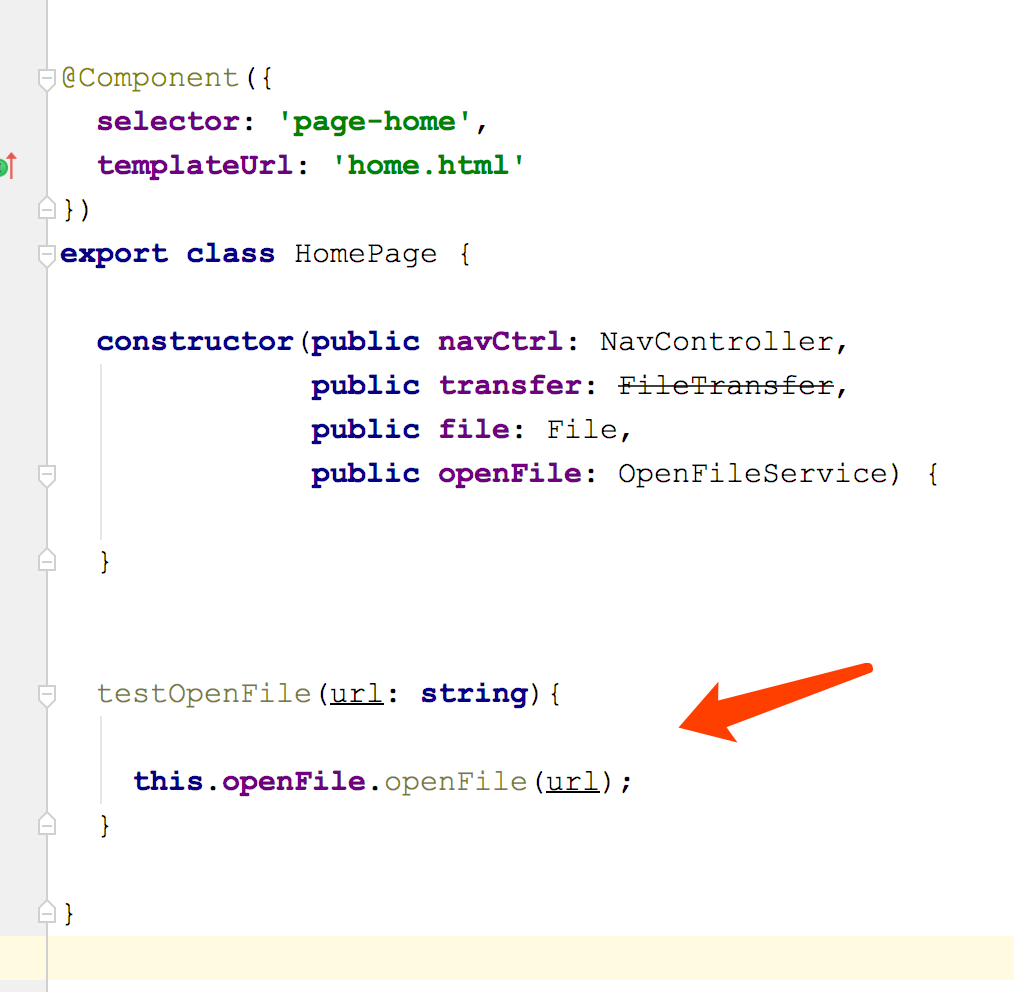一、实现思路
我们在写插件之前需要想清楚: 1. 网络资源只是一个请求链接不是真正的文件 2. 调用本地应用打开文件,这个文件是不是需要真实存在本地,才能打开。 3. 如果需要存在本地目录,那么应该存在什么样的目录。 想清楚之后我们来实现: 首先我来说下我的实现思路: 点击请求链接 ---> 获取请求链接 ---> 根据链接下载网络资源到本地 ---> 调用自定义插件 ---> 调用本地应用打开下载到本地的资源文件
二、动手实践
1. 编写自定义的插件:
1.使用plugman创建自己的自定义插件,并添加android平台 2.编辑调用的openFile.js
js
const exec = require('cordova/exec');
exports.openFile = function (param, success, error) {
exec(success, error, 'OpenFilePlugin', 'openFile', [param]);
};3.编辑实现的功能的java类
java
package com.ai.ced.openfile;
import android.app.Activity;
import android.content.Intent;
import android.net.Uri;
import android.support.v4.content.FileProvider;
import org.apache.cordova.CordovaPlugin;
import org.apache.cordova.CallbackContext;
import org.json.JSONArray;
import org.json.JSONException;
import java.io.File;
/**
* This class echoes a string called from JavaScript.
*/
public class OpenFilePlugin extends CordovaPlugin {
public static Activity activity;
@Override
public boolean execute(String action, JSONArray args, CallbackContext callbackContext) throws JSONException {
if (action.equals("openFile")) {
String message = args.getString(0);
this.openFile(message, callbackContext);
return true;
}
return false;
}
private void openFile(String message, CallbackContext callbackContext) {
this.activity = this.cordova.getActivity();
// this.openAndroidFile("/storage/emulated/0/ReleaseChannel.txt");
this.openAndroidFile(message);
}
public void openAndroidFile(String filepath){
Intent intent = new Intent();
File file = new File(filepath);
// intent.addFlags(Intent.FLAG_ACTIVITY_NEW_TASK);//设置标记
Uri uri = FileProvider.getUriForFile(activity,
BuildConfig.APPLICATION_ID + ".fileProvider",
file);
intent.addFlags(Intent.FLAG_GRANT_READ_URI_PERMISSION);
intent.setAction(Intent.ACTION_VIEW);//动作,查看
// intent.setDataAndType(Uri.fromFile(file), this.getMIMEType(file));//设置类型
intent.setDataAndType(uri, this.getMIMEType(file));//设置类型
this.activity.startActivity(intent);
}
private String getMIMEType(File file) {
String type="*/*";
String fName = file.getName();
//获取后缀名前的分隔符"."在fName中的位置。
int dotIndex = fName.lastIndexOf(".");
if(dotIndex < 0)
return type;
/* 获取文件的后缀名 */
String fileType = fName.substring(dotIndex,fName.length()).toLowerCase();
if(fileType == null || "".equals(fileType))
return type;
//在MIME和文件类型的匹配表中找到对应的MIME类型。
for(int i=0;i<MIME_MapTable.length;i++){
if(fileType.equals(MIME_MapTable[i][0]))
type = MIME_MapTable[i][1];
}
return type;
}
private static final String[][] MIME_MapTable={
//{后缀名, MIME类型}
{".3gp", "video/3gpp"},
{".apk", "application/vnd.android.package-archive"},
{".asf", "video/x-ms-asf"},
{".avi", "video/x-msvideo"},
{".bin", "application/octet-stream"},
{".bmp", "image/bmp"},
{".c", "text/plain"},
{".class", "application/octet-stream"},
{".conf", "text/plain"},
{".cpp", "text/plain"},
{".doc", "application/msword"},
{".docx", "application/msword"},
{".exe", "application/octet-stream"},
{".gif", "image/gif"},
{".gtar", "application/x-gtar"},
{".gz", "application/x-gzip"},
{".h", "text/plain"},
{".htm", "text/html"},
{".html", "text/html"},
{".jar", "application/java-archive"},
{".java", "text/plain"},
{".jpeg", "image/jpeg"},
{".JPEG", "image/jpeg"},
{".jpg", "image/jpeg"},
{".js", "application/x-javascript"},
{".log", "text/plain"},
{".m3u", "audio/x-mpegurl"},
{".m4a", "audio/mp4a-latm"},
{".m4b", "audio/mp4a-latm"},
{".m4p", "audio/mp4a-latm"},
{".m4u", "video/vnd.mpegurl"},
{".m4v", "video/x-m4v"},
{".mov", "video/quicktime"},
{".mp2", "audio/x-mpeg"},
{".mp3", "audio/x-mpeg"},
{".mp4", "video/mp4"},
{".mpc", "application/vnd.mpohun.certificate"},
{".mpe", "video/mpeg"},
{".mpeg", "video/mpeg"},
{".mpg", "video/mpeg"},
{".mpg4", "video/mp4"},
{".mpga", "audio/mpeg"},
{".msg", "application/vnd.ms-outlook"},
{".ogg", "audio/ogg"},
{".pdf", "application/pdf"},
{".png", "image/png"},
{".pps", "application/vnd.ms-powerpoint"},
{".ppt", "application/vnd.ms-powerpoint"},
{".pptx", "application/vnd.ms-powerpoint"},
{".prop", "text/plain"},
{".rar", "application/x-rar-compressed"},
{".rc", "text/plain"},
{".rmvb", "audio/x-pn-realaudio"},
{".rtf", "application/rtf"},
{".sh", "text/plain"},
{".tar", "application/x-tar"},
{".tgz", "application/x-compressed"},
{".txt", "text/plain"},
{".wav", "audio/x-wav"},
{".wma", "audio/x-ms-wma"},
{".wmv", "audio/x-ms-wmv"},
{".wps", "application/vnd.ms-works"},
//{".xml", "text/xml"},
{".xml", "text/plain"},
{".z", "application/x-compress"},
{".zip", "application/zip"},
{"", "*/*"}
};
}到这主要的功能就已经完成了。
三、怎么调用
1.在ionic项目中需要配合File、FileTransfer进行使用。既然需要组合,那我们写一个工具service。
ts
import { Injectable } from '@angular/core';
import { FileTransferObject, FileTransfer } from '@ionic-native/file-transfer';
import { File } from '@ionic-native/file';
import { CommonUtilService } from './commonUtilService';
declare let OpenFilePlugin: any;
/*
Generated class for the WechatShareServiceProvider provider.
See https://angular.io/guide/dependency-injection for more info on providers
and Angular DI.
*/
@Injectable()
export class OpenFileService {
constructor(private transfer: FileTransfer,
private comUtil: CommonUtilService,
private file: File) {}
openFile(url: string){
console.log("OpenFileService enter");
const fileTransfer: FileTransferObject = this.transfer.create();
// const url = 'http://www.gz10010.shop/resource/download/1111111111111111111111.pdf';
// 获取文件名1111111111111111111111.pdf
let tempUrl = url.substr(url.lastIndexOf("/")+1);
// 获取存储路径
// this.file.externalCacheDirectory获取对应app的缓存路径file:///storage/emulated/0/Android/data/io.ionic.starter/cache/
// 需要去掉 file:/// 如果不去掉会报路径找不到该路径
// /storage/emulated/0/Android/data/io.ionic.starter/cache/ 正确路径
let storeUrl = this.file.externalCacheDirectory.substr(7);
fileTransfer.download(url, storeUrl + tempUrl).then( (data) => {
// 拼接打开的文件路径
let openUrl = storeUrl + tempUrl;
OpenFilePlugin.openFile(openUrl);
}).catch( err => {
this.comUtil.showAlert({title: "文件下载失败", message: JSON.stringify(err)});
});
}
}2. 业务调用


四、问题解决
1. 真机下:android.os.FileUriExposedException:exposed beyond app through Intent.getData()
方案一: 1.在AndroidManifest.xml文件的application里添加
xml
<provider
android:name="android.support.v4.content.FileProvider"
android:authorities="app的包名.fileProvider"
android:grantUriPermissions="true"
android:exported="false">
<meta-data
android:name="android.support.FILE_PROVIDER_PATHS"
android:resource="@xml/file_paths"/>
</provider>2.在res目录下新建一个xml文件夹,并且新建一个file_paths的xml文件 3.打开file_paths.xml文件添加如下内容
<?xml version="1.0" encoding="utf-8"?>
<paths>
<external-path path="Android/data/app的包名/" name="files_root"/>
<external-path path="." name="external_storage_root"/>
</paths>方案二: 在MainActivity的onCreate方法中添加如下代码
if (Build.VERSION.SDK_INT >= Build.VERSION_CODES.N) {
StrictMode.VmPolicy.Builder builder = new StrictMode.VmPolicy.Builder();
StrictMode.setVmPolicy(builder.build());
}2. 编译报:Didn't find class "android.support.v4.content.FileProvider" on path:
添加v4依赖包,重新clean、rebuild 
3. 权限问题
xml
<uses-permission android:name="android.permission.MOUNT_UNMOUNT_FILESYSTEMS" />
<uses-permission android:name="android.permission.READ_EXTERNAL_STORAGE" />
<uses-permission android:name="android.permission.BLUETOOTH" />
<uses-permission android:name="android.permission.WRITE_EXTERNAL_STORAGE" />
<uses-permission android:name="android.permission.BLUETOOTH_ADMIN" />
<uses-permission android:name="android.permission.CAMERA" />
<uses-permission android:name="android.permission.READ_PHONE_STATE" />
<uses-permission android:name="android.permission.INTERNET" />
<uses-permission android:name="android.permission.VIBRATE" />
<uses-feature android:name="android.hardware.camera.autofocus" />
<uses-permission android:name="android.permission.FLASHLIGHT" />
<uses-feature android:name="android.hardware.camera" android:required="true" />
<uses-permission android:name="android.permission.ACCESS_COARSE_LOCATION" />
<uses-permission android:name="android.permission.ACCESS_FINE_LOCATION" />
<uses-permission android:name="android.permission.ACCESS_WIFI_STATE" />
<uses-feature android:name="android.hardware.location.gps" />
<uses-permission android:name="android.permission.NFC" />
<uses-feature android:name="android.hardware.nfc" android:required="true" />
<uses-permission android:name="android.permission.MANAGE_DOCUMENTS" />
<uses-permission android:name="android.permission.RECORD_AUDIO" />
<uses-permission android:name="android.permission.ACCESS_NETWORK_STATE" />